By bringing together Voice over Internet Protocol (VoIP) technology and Customer Relationship Management (CRM) software, businesses can streamline their communication processes, enhance customer interactions, and improve overall efficiency. Here we’ll explore the concept of CRM & VoIP integration, how it works, and the numerous benefits it brings to organizations of all sizes and industries.
- What is a VoIP system?
- What is CRM software?
- What is VoIP CRM integration?
- How does a CRM VoIP integration work?
- How to choose a VoIP for CRM integration
- Best CRM software you can integrate with VoIP
- Top VoIP systems for CRM integration
- How can businesses benefit from integrating VoIP and CRM?
- Things to avoid when thinking about CRM for VoIP integration
- VoIP CRM integration can make your business better
What is a VoIP system?
VoIP phone systems are communication solutions that allow voice calls to be transmitted over the Iternet instead of traditional phone lines. VoIP converts analog voice signals into digital data packets, which are then transmitted over IP networks. This enables businesses to make and receive calls using internet-connected devices such as computers, smartphones, or VoIP-enabled desk phones.
VoIP systems offer cost savings, scalability, flexibility, and a wide range of advanced features compared to traditional phone systems.
What is CRM software?
CRM software refers to Customer Relationship Management tools designed to help businesses manage and nurture their relationships with customers. This software provides a centralized database for storing customer information, tracking interactions, and managing sales, marketing, and customer service activities.
By choosing the right CRM for key tasks, organizations can gain valuable insights into their customer base, improve customer satisfaction, and optimize their sales processes.
What is VoIP CRM integration?
Integrating VoIP and CRM is the process of combining Voice Over IP technology with CRM software to create a seamless communication and data management solution.
A VoIP integration with CRM enables businesses to synchronize their call data, client information, and communication history between the platforms. In other words, this type of integration allows you to use information recorded in your CRM for outbound marketing and high-quality communications with customers and teammates.
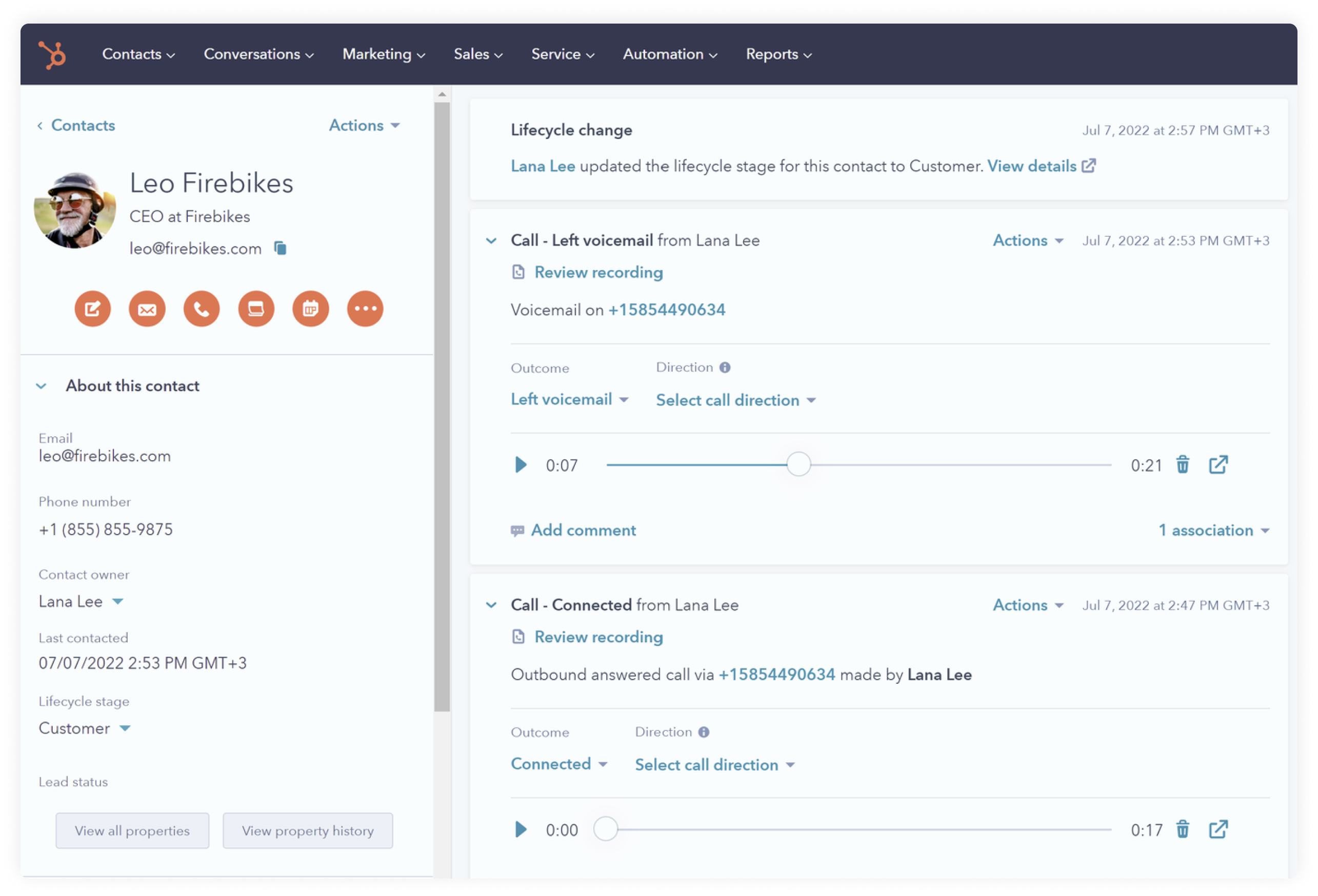
How does a CRM VoIP integration work?
CRM VoIP integration involves the coordination of various components to enable smooth communication and data exchange between the services. Here is an overview of how this works:
- API integration: For starters, both VoIP and CRM must have compatible Application Programming Interfaces (APIs) that allow for data exchange. These APIs establish a connection between the two systems, enabling seamless integration.
- Data synchronization: Once the API integration is in place, the services synchronize their databases to ensure that customer information, call logs, and communication history are up to date in both systems. By syncing your VoIP phone system with CRM you will be able to get accurate reporting and analysis.
- Automatic call logging: During incoming and outgoing calls, the CRM system captures call details, including caller ID, call duration, and call outcomes. This information is automatically logged into the CRM platform, eliminating the need for manual data entry.
- Click-to-call functionality: With integration, users can initiate calls directly from the CRM by clicking on a phone number. This feature streamlines the calling process and reduces the need to switch between applications.
- Caller information pop-up: When an incoming call is received, the CRM system retrieves customer data associated with the caller ID and displays it in a pop-up window. This allows employees to access relevant customer information and provide personalized service without delay.
- Call recording and transcription: CRM and VoIP system integration often includes the ability to record calls and transcribe them for future reference. These recordings and transcriptions can be attached to customer records in the Customer Relation Management system, providing a comprehensive view of customer interactions and facilitating quality assurance and training processes.
- Task automation: Integration enables automation of certain tasks based on call events. For example, after a sales call, the system can automatically create follow-up tasks or schedule appointments in the CRM software, ensuring that important actions are not overlooked.
- Enhanced reporting and analytics: VoIP & CRM integration enables powerful reporting and analytics capabilities by combining call data with CRM data. Businesses can generate detailed reports on call volume, call duration, conversion rates, and customer satisfaction metrics. These insights help identify trends, evaluate performance, and make data-driven decisions to improve business strategies.
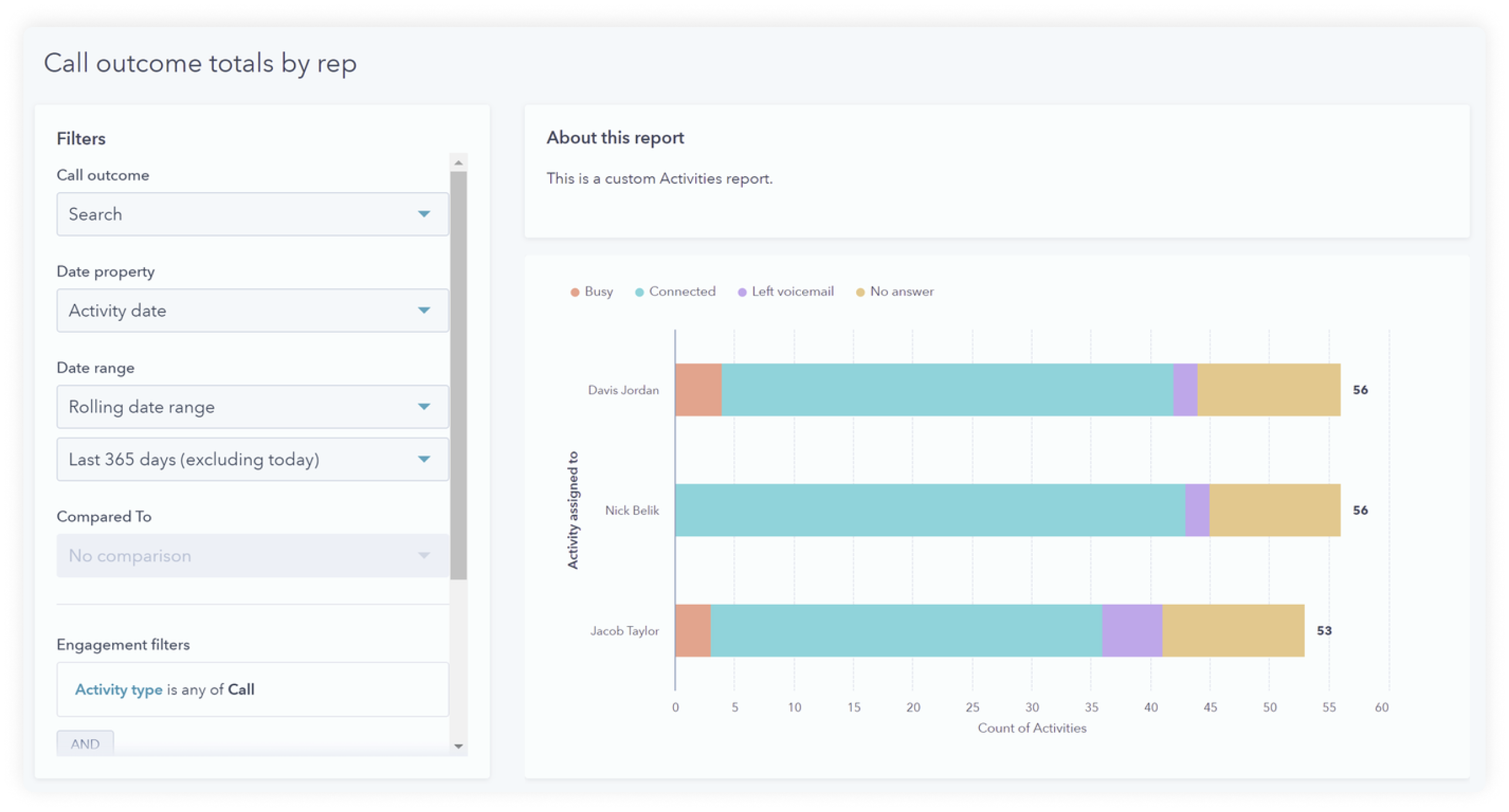
It is important to keep in mind that your CRM capabilities will ultimately depend on the type of CRM that you use and the type of VoIP that you go with as well.
How to choose a VoIP for CRM integration
When selecting a VoIP for CRM integration, you should keep the following factors in mind:
- Make sure the integration is compatible: Ensure that the service provider you choose offers you to integrate the VoIP system with the CRM you prefer. Check for official integrations or APIs that allow data synchronization and call management within the CRM system.
- Look for a rich feature set: Evaluate the features offered by the VoIP system, such as call routing, call recording, call analytics, and real-time access to customer information during calls. Choose a system that aligns with your business requirements and enhances your CRM processes.
- You should be able to scale: Consider the scalability of the VoIP phone system to accommodate your business growth. It should have the capacity to handle increased call volumes and support additional CRM integrations as your business expands.
- Choose a service with an intuitive interface: Look for a user-friendly VoIP system that simplifies the process of making and receiving calls, accessing CRM data, and managing call activities. Intuitive interfaces and seamless workflows contribute to better user adoption and productivity.
- Consider a customer support quality: Choose a VoIP provider that offers reliable customer support. Prompt assistance and technical guidance are crucial for resolving any integration issues and ensuring smooth communication operations among your support team.
- Do not neglect security and compliance: Prioritize a VoIP that provides robust security measures to protect sensitive customer data. Compliance with industry standards, such as GDPR or HIPAA, may be necessary depending on your business requirements.
Best CRM software you can integrate with VoIP
When it comes to integration, several leading CRM solutions offer seamless compatibility and integration options. Here are some of the top platforms offering CRM integration with VoIP:
1. Salesforce
Salesforce is a widely used CRM platform that offers comprehensive features for sales, marketing, and customer service. Its integration capabilities with VoIP systems allow for call tracking, call logging, and real-time data synchronization. Integration with Salesforce is supported by MightyCall.
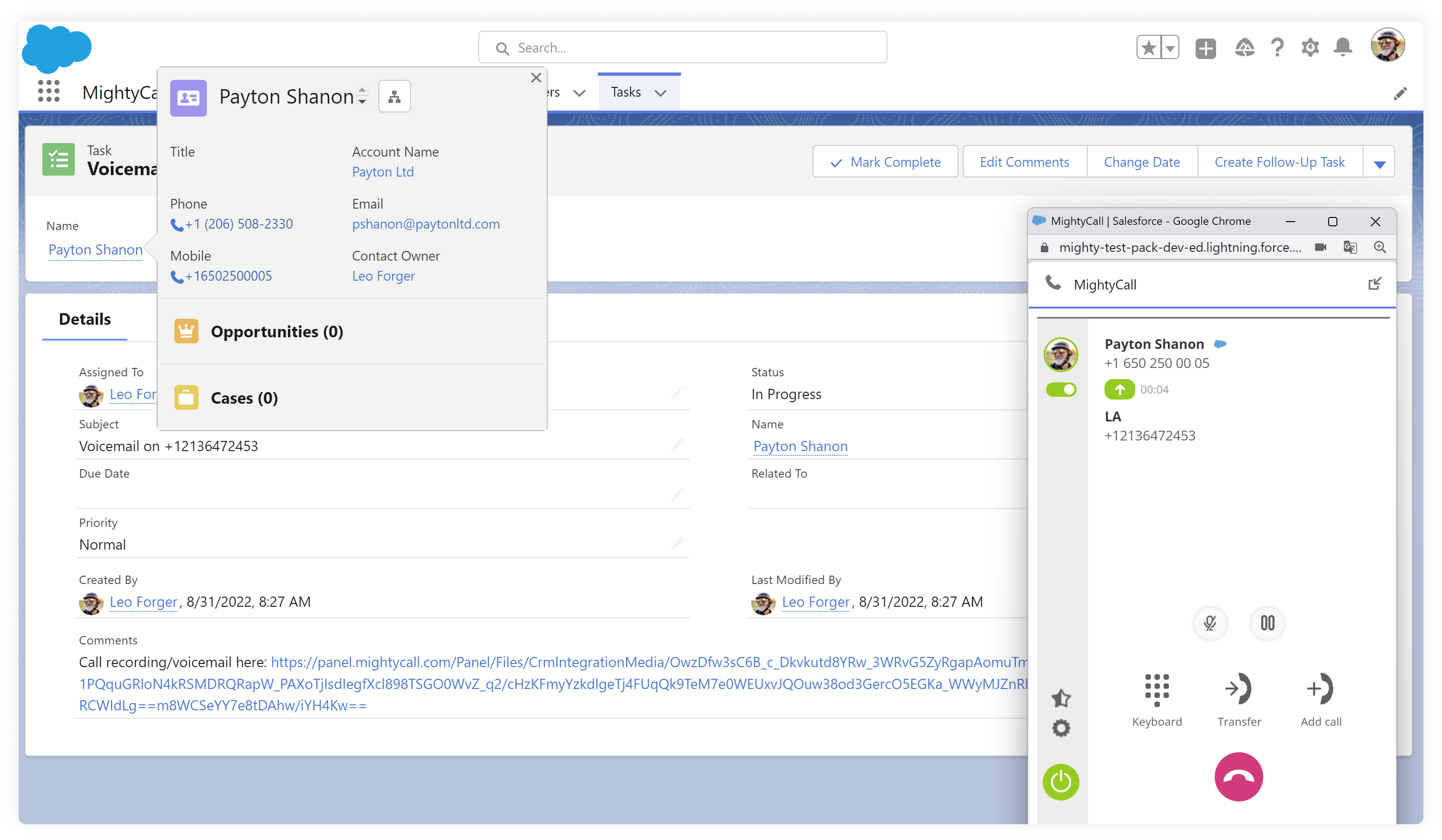
2. HubSpot
HubSpot is a popular CRM software known for its robust marketing and sales automation capabilities. Integrating HubSpot with VoIP systems enables call tracking, call recording, and automatic call logging, providing valuable insights for sales and marketing teams. MightyCall also supports integration with Hubspot.
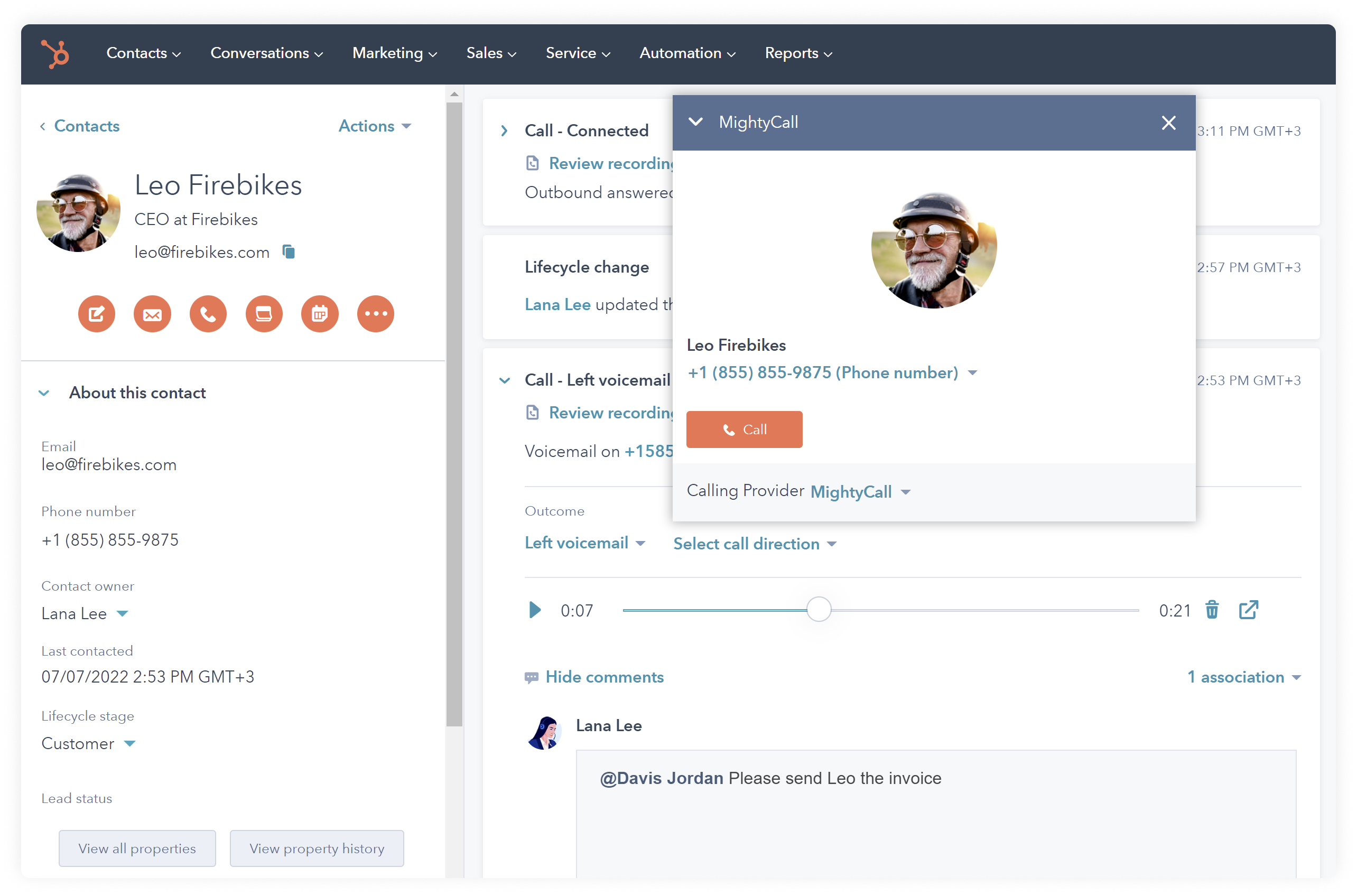
3. Zoho CRM
Zoho CRM is a feature-rich CRM platform. With Zoho CRM integration, businesses can automate call logging, track call history, and access customer information during calls, empowering their sales and customer service teams. MightyCall supports integration with Zoho.
4. Microsoft Dynamics 365
Microsoft Dynamics 365 is a comprehensive CRM solution. It enables businesses to enhance their customer interactions by providing real-time access to customer information, call logs, and call recordings within the CRM platform.

5. SugarCRM
SugarCRM offers flexible CRM solutions that can be easily integrated with phone systems. By integrating SugarCRM with VoIP, businesses can streamline call management, automate call logging, and access customer data during calls, improving their overall customer engagement.
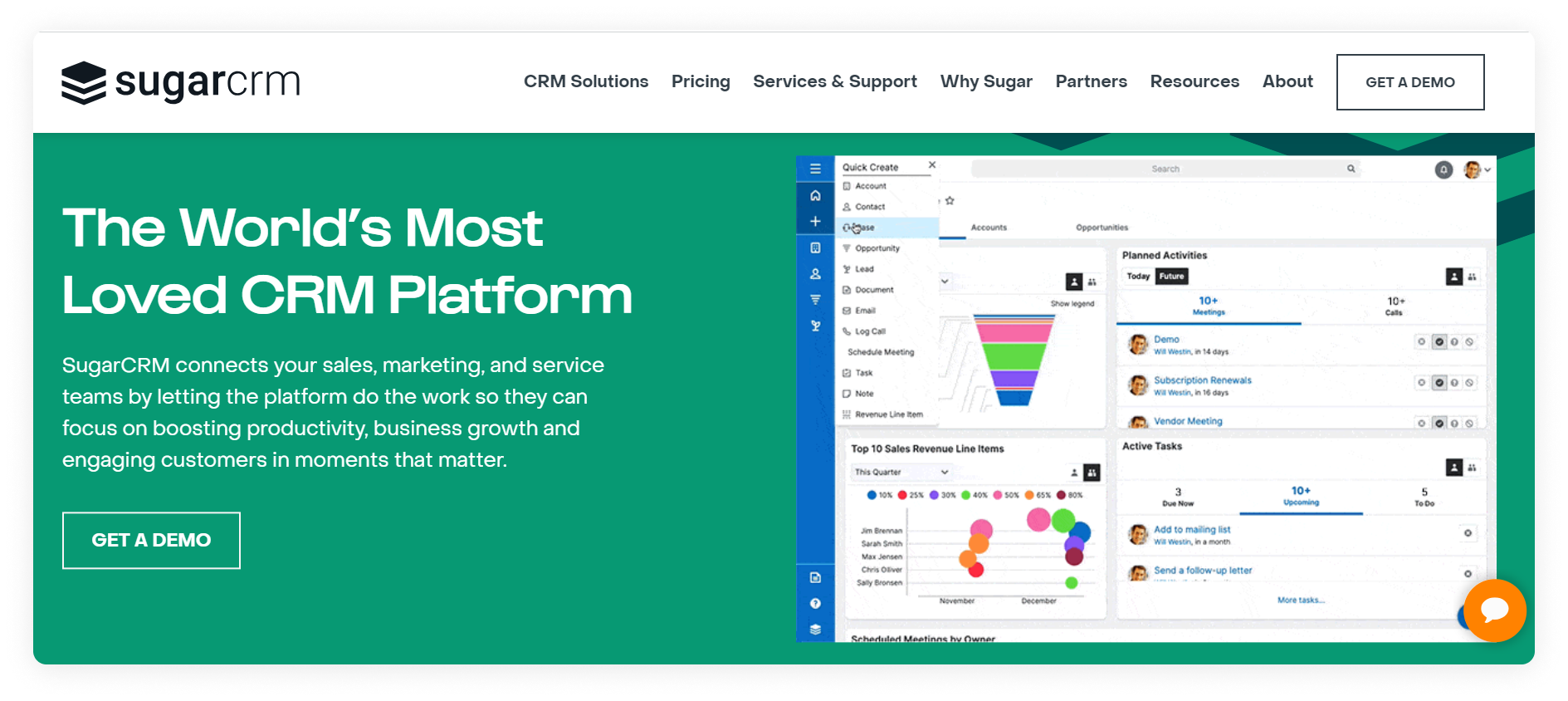
6. Zendesk
Zendesk is a customer service and support platform. With Zendesk integration, businesses can automatically log customer calls, access call recordings, and leverage customer data to provide personalized support.
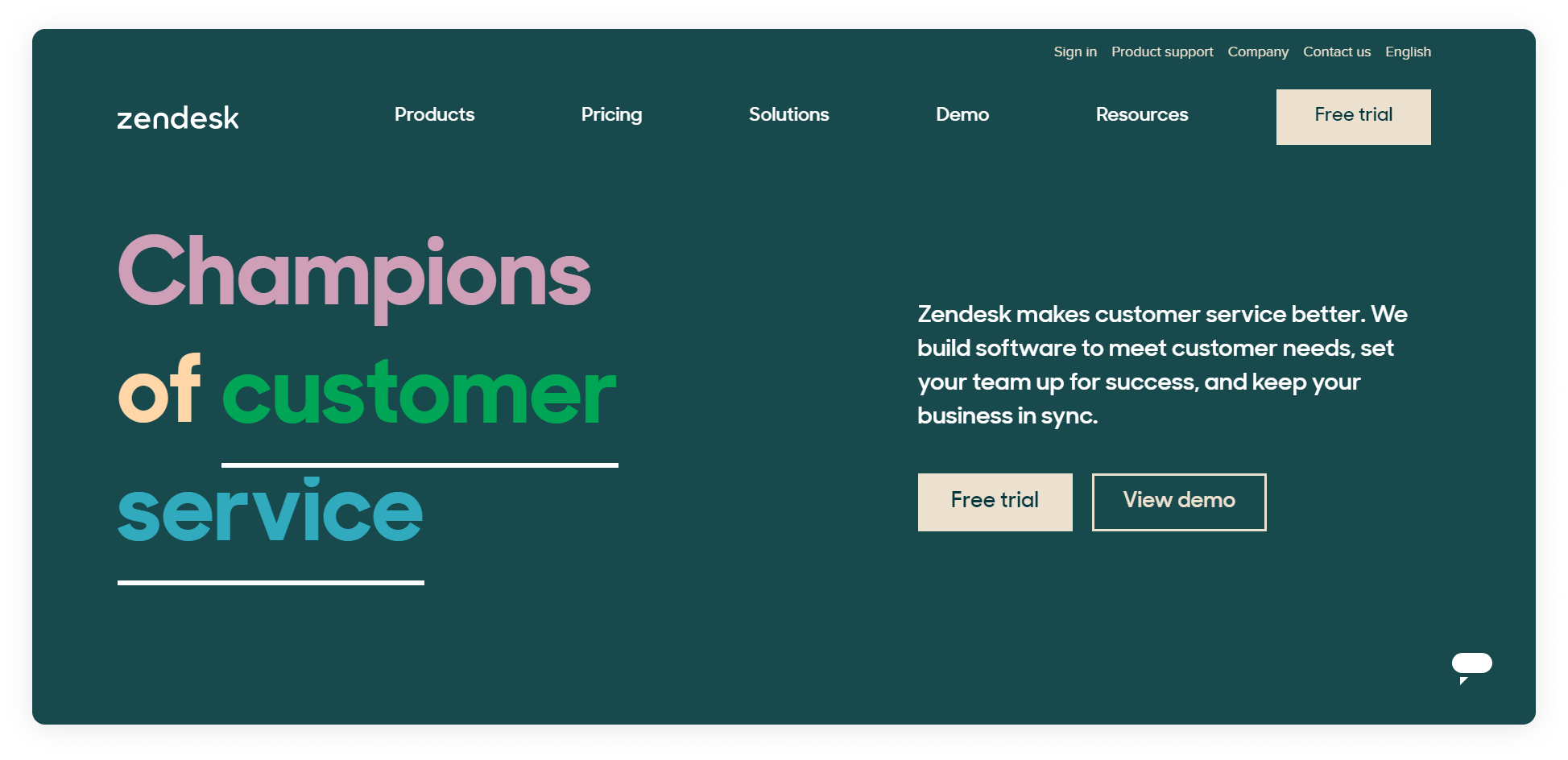
7. Freshworks CRM
Freshworks CRM, formerly known as Freshsales, supports service collaboration of VoIP and its CRM software to level up business communication and customer management. It allows businesses to track and log calls, access call recordings, and sync call data with customer records, enabling more efficient sales and customer service processes.
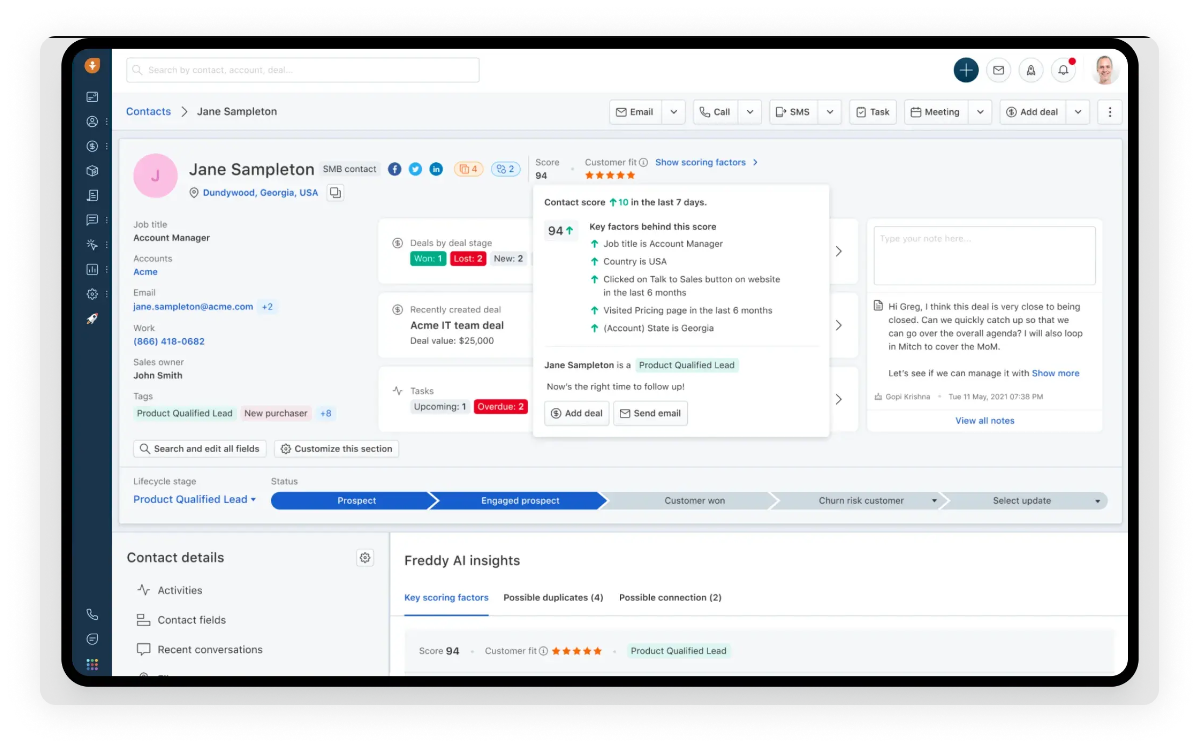
Top VoIP systems for CRM integration
Here are brief reviews of some top virtual phone systems that provide VoIP-CRM integration capabilities:
1. MightyCall
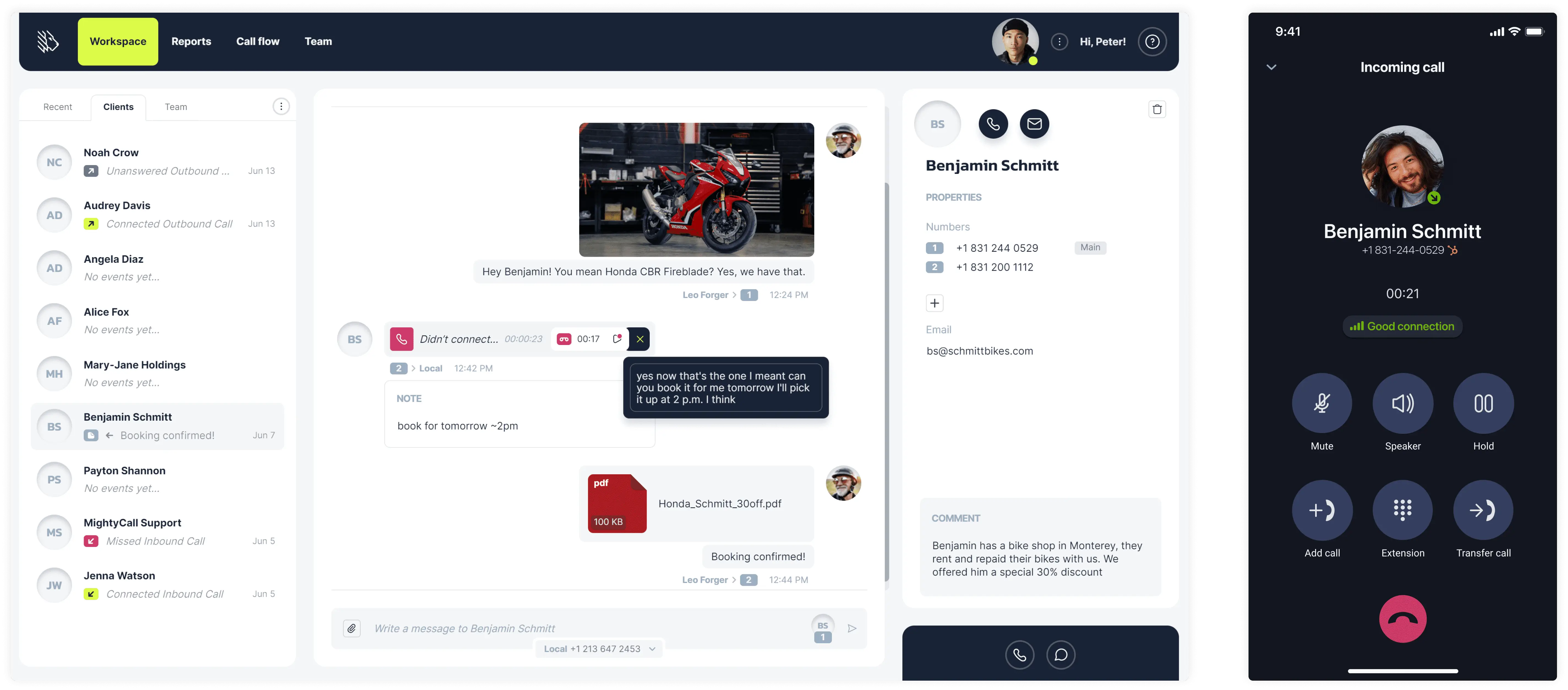
MightyCall is a cloud-based VoIP service that provides comprehensive communication solutions for businesses. It offers integration options with popular CRM platforms like:
- Salesforce
- HubSpot
- Zoho CRM
- Zapier
Best for
Small and medium-sized businesses
Pricing
All prices are per user/month:
- Core: $15
- Pro: $20
- Enterprise: Contact them
Pros & cons
| Pros | Cons |
|---|---|
| Offers integrations with key CRMs on the market | The lowest tier only includes 2 local or toll-free business numbers |
| Easy to use | |
| Incredibly clean interface | |
| Live call monitoring | |
| High in scalability |
2. Dialpad
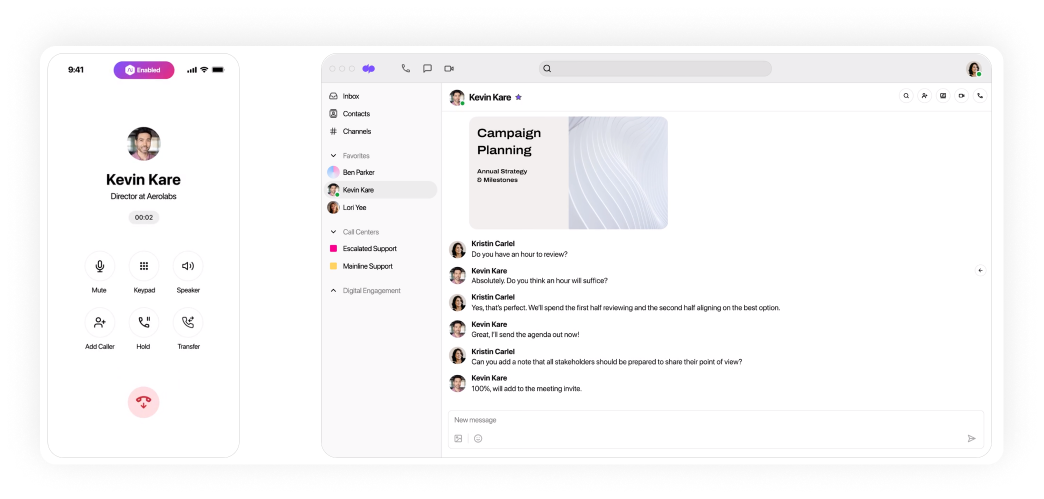
Dialpad is a modern cloud communication platform that offers VoIP and CRM integration. It seamlessly integrates with CRM solutions such as:
- Salesforce
- HubSpot
- Zendesk
Best for
Small businesses
Pricing
All prices are per user/month:
- Standard: $15
- Pro: $25
- Enterprise: Contact them
Pros & cons
| Pros | Cons |
|---|---|
| Make and receive calls from CRM platform | Zendesk has been reported to have issues with support |
| Access customer data during call | The interface is not always clearly designed |
| Automate call logging |
3. Nextiva
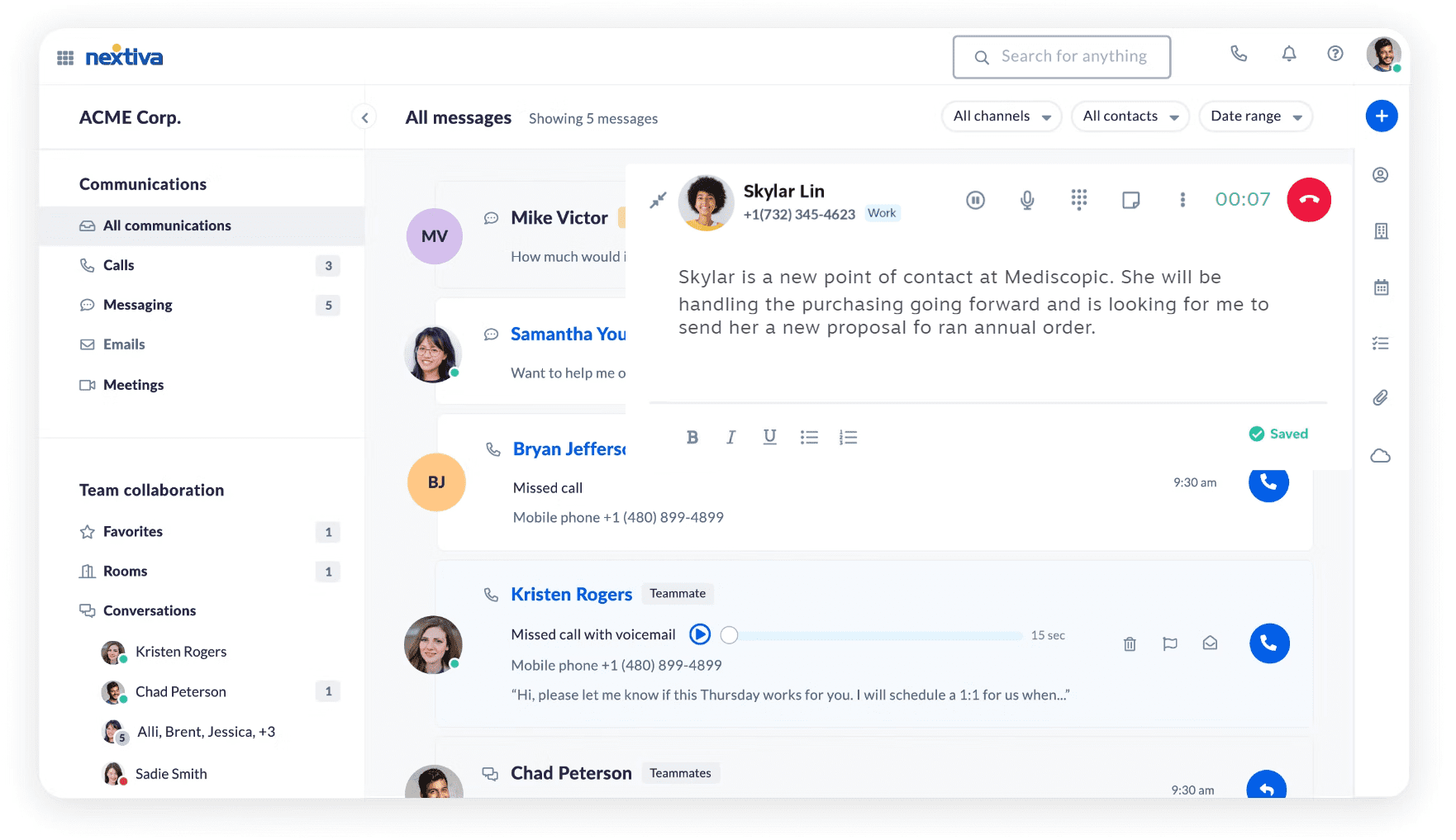
Nextiva is a VoIP service provider that offers integration options to streamline communication and customer relationship management. It integrates with CRM platforms like:
- Salesforce
- Zendesk
- Hubspot
Best for
Small businesses
Pricing
Nextiva’s pricing works differently from the others, since prices are all different depending on the size of your business. If your business is on the smaller side (5-19 employees), the prices are (all per user/month):
- Essential: $21.95
- Professional: $25.95
- Enterprise: $35.95
Pros & cons
| Pros | Cons |
|---|---|
| Track and log calls | Nextiva has been found to be overly complex and sometimes difficult to use |
| Improve team collaboration | |
| Enhance customer service |
4. RingCentral
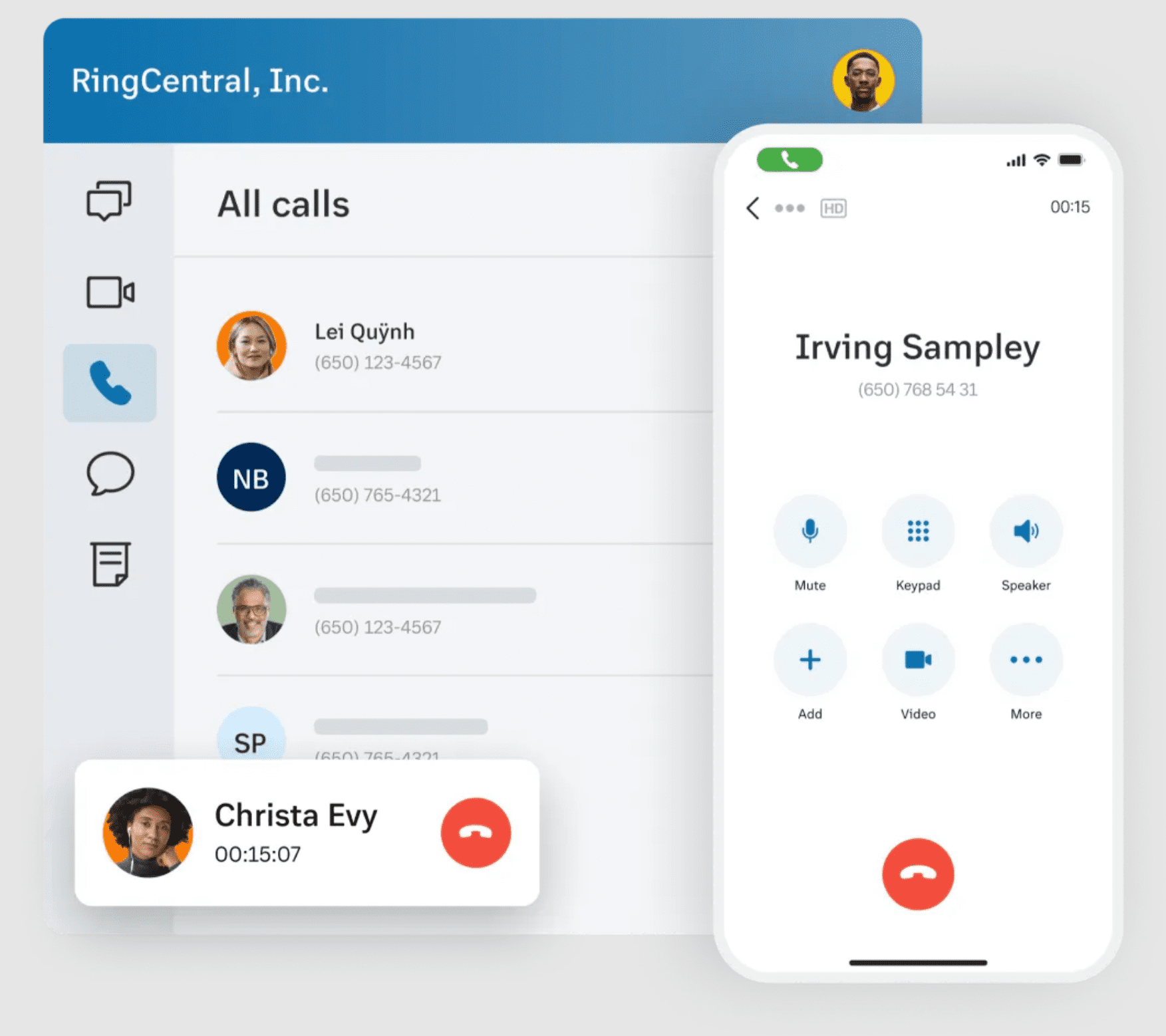
RingCentral is a cloud communications and collaboration platform that provides VoIP CRM integration. It integrates with popular CRM solutions such as:
- Salesforce
- Microsoft Dynamics 365
- Sales Nexus
Best for
Medium-sized businesses
Pricing
All prices are per user/month:
- Core: $20
- Advanced: $25
- Ultra: $35
Pros & cons
| Pros | Cons |
|---|---|
| Call logging | Occasional delays reported in customer support |
| Offers call recording | Issues have reported with Click-to-dial when using CRM |
| Can access key customer info during a call |
5. JustCall
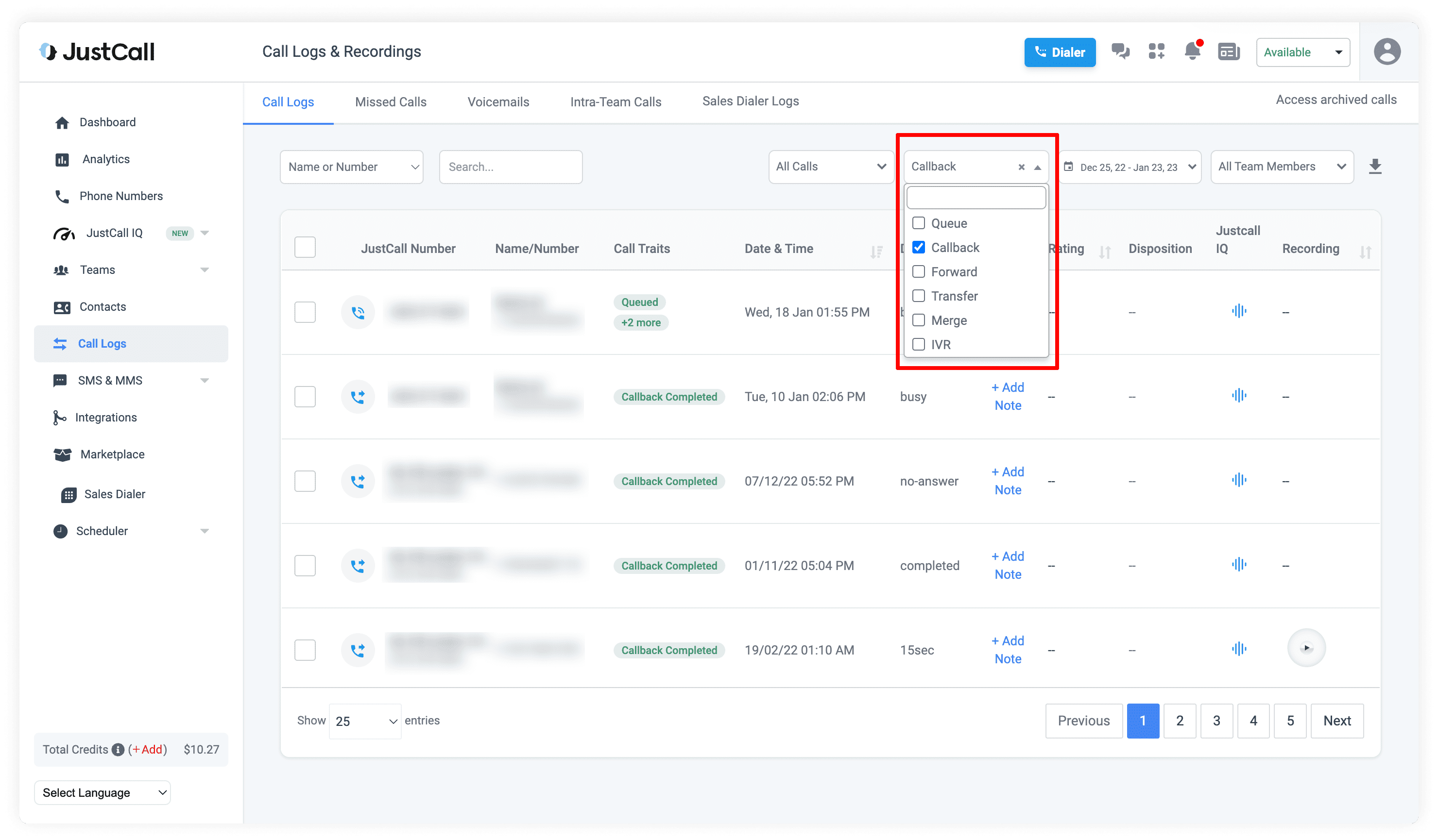
JustCall is a cloud-based phone system that offers CRM and VoIP integration. It integrates with popular CRM platforms like:
- Salesforce
- HubSpot
- Zapier
Best for
Medium and larger-sized businesses like contact centers
Pricing
All prices are per user/month:
- Standard: $24
- Premium: $48
- Custom: Talk to them to get a quote
Pros & cons
| Pros | Cons |
|---|---|
| Logs calling and SMS | Sound quality issues have been found by some users |
| Offers key CRM support | Multi-level IVR is not available on the lowest tier |
| Can access key customer info during a call |
How can businesses benefit from integrating VoIP and CRM?
Businesses can optimize their communication strategies, strengthen customer relationships, and drive growth when they figure out how to integrate VoIP into CRM.
Using VoIP with CRM software brings numerous other benefits that can significantly impact your business operations and customer interactions. Here are some key advantages:
- Enhanced customer experience: You can access comprehensive customer information during calls, enabling personalized interactions and efficient issue resolution. This leads to improved customer satisfaction and loyalty.
- Improved sales efficiency: Integration allows for automatic call logging, eliminating manual data entry and saving valuable time for sales representatives. The ability to initiate calls from the CRM platform and access call records also enhances sales efficiency.
- Streamlined workflows: CRM VoIP integration facilitates seamless data synchronization between the services, eliminating the need for duplicate data entry and ensuring that customer information is consistent across platforms.
- Better sales and marketing insights: By combining call data with CRM analytics, businesses can gain valuable insights into customer behavior, preferences, and buying patterns. This information helps optimize sales and marketing strategies for better results.
- Improved collaboration: VoIP integration fosters collaboration between teams by providing a centralized platform for communication and customer data. This promotes better coordination and enables teams to work together seamlessly.
- Cost savings: VoIP systems are inherently cost-effective, and integration with CRM adds further value by reducing administrative overhead, eliminating manual processes, and optimizing resource utilization.
Things to avoid when thinking about CRM for VoIP integration
With the plethora of VoIP-CRM integrations available, there are not only things to look for – there are also things to look out for. Here are some to keep in mind:
- Not understanding why you need it: A lot of time, with new technology, people decide they need it just because, instead of figuring out why. And with something like CRMs, which are tailor-made to different needs, just wantonly choosing can be a big mistake.
- Expecting that one CRM will solve your issues: When picking a CRM, it’s important to remember that while it will help you, you’ll need a lot more than that to succeed. That’s why MightyCall offers so many great features that can give you the tools you need.
- Changing your strategy: A CRM should be a tool for you to be able to carry out your vision; you should not have to shape your vision to fit a service. There are so many CRMs out there – one will surely be a match for what you want to achieve.
- Not asking your team what they need: CRMs are supposed to fill a gap in terms of what you can accomplish. But the folks accomplishing that thing–be it sales or customer service–probably know what they need. So ask them! Make sure to bring everyone into the process if it can help you make a better selection.
- Not taking full advantage of offerings: A CRM may be designed for a given task, but there may be lots of ways that you can use that. Be sure to look up different ways to use your CRM successfully so that you leave nothing crucial on the cutting room floor.
VoIP CRM integration can make your business better
Integrate your VoIP service with your CRM and unlock limitless possibilities. When you run a business, it’s important to leave absolutely nothing on the table. If you have the chance to improve customer communication or teamwork, you should leap at it.
So, what is VoIP CRM integration? It’s something that lets you embrace the power of integration to optimize your communication strategies, strengthen customer relationships, and unlock the full potential of your business.





























